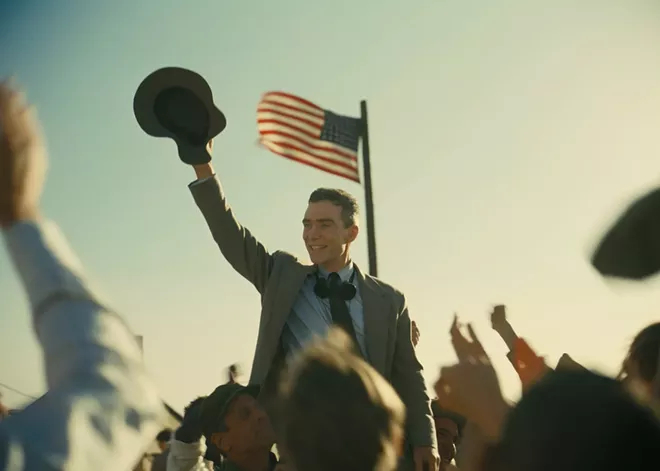As dazzling as Christopher Nolan's filmmaking style often is, he still can't escape the trappings of the historical biopic with his three-hour epic Oppenheimer, an overstuffed and often overwhelming account of the man known as the "father of the atomic bomb." Spanning a period of decades in the life of physicist J. Robert Oppenheimer (Cillian Murphy), the movie builds to one of the most important events in human history and then spends another hour on petty political squabbles. Nolan gives nearly equal weight to these two elements, framing the story around a pair of contentious government hearings.
The first is the 1954 Atomic Energy Commission hearing about revoking Oppenheimer's security clearance, ostensibly over his potential communist sympathies. Oppenheimer's testimony covers his entire career, from his time as a student in Europe in the 1920s to his leadership of the Manhattan Project, the government initiative to develop the first atomic bomb during World War II. It's a familiar biopic structural device, and Nolan mostly sticks to it, toning down the nonlinear storytelling he's known for.
The movie still jumps around in time, though, mainly in its depiction of a second, much more public government hearing, the Senate's confirmation of Secretary of Commerce nominee Lewis Strauss (Robert Downey Jr.) in 1959. For anyone not familiar with the details of Oppenheimer's life, it's not immediately clear what Strauss' confirmation has to do with Oppenheimer, even after the movie shows Strauss recruiting Oppenheimer for an academic position following the war. Strauss' presence seems almost superfluous for the first two-thirds of the movie, as Nolan devotes most of his attention to the monumental project of developing the bomb.
That's when Oppenheimer is at its most gripping, as Oppenheimer is recruited by Gen. Leslie Groves (Matt Damon) to oversee the top-secret program headquartered at Los Alamos, New Mexico. Oppenheimer hand-picks a team of scientists to join him at a location that he's also hand-picked, and he's both arrogant enough and brilliant enough to run things his own way, sometimes even in opposition to the military's preferences. Murphy plays Oppenheimer as confident but troubled, and while he's sometimes inscrutable, both to his associates and to the audience, he's always captivating.
Nolan himself is both arrogant enough and brilliant enough to recruit an absurdly stacked cast of familiar faces, many of whom show up to deliver just a handful of lines. The extensive array of scientists are hard to tell apart, even when played by recognizable actors, and very few of them exhibit any distinctive personality. Emily Blunt, as Oppenheimer's wife Kitty, and Florence Pugh, as his mistress Jean Tatlock, make slightly more memorable impressions, but ultimately the supporting characters are all subordinate to Oppenheimer.
That's what makes Strauss' prominent position in the movie's third hour so frustrating, especially after the bravura presentation of the Manhattan Project's successful nuclear test. The deployment of the bomb seems like it would be the climax of Oppenheimer's story, but instead Nolan digs into the minutiae of those government hearings, which shift from framing devices to the primary focus. Nolan relies on awe-inspiring practical effects to illustrate the all-consuming power of the first nuclear detonation and its impact on Oppenheimer, which contrasts with the stark black-and-white visuals of the Strauss scenes.
The prickly, vindictive Strauss devoted himself to ruining Oppenheimer's post-war career for apparently small-minded reasons, and Downey makes him suitably reprehensible. But the political machinations come across as a footnote to the terrifying wartime achievements, dragging down the movie's momentum. Thanks to Murphy, Oppenheimer remains a compelling figure even as the movie around him slowly implodes. ♦

























